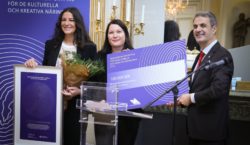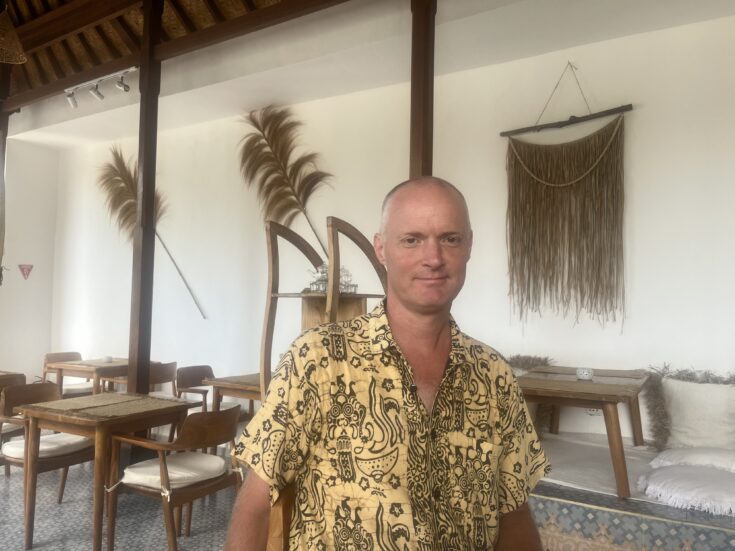
Norwegian Ole Petter Høie, an experienced entrepreneur on his third startup, is currently exploring the intersection of gaming and education with gamified history lessons under the name “The History Challenge.”
With a background that includes a period in his twenties as a Hare Krishna monk, Ole has previous experiences within health products, and prior success in the educational gaming industry. Now, he is leading a project that seeks to transform history education.
ScandAsia met with him on a very modern Balinese setting, for a chat about his innovative project.
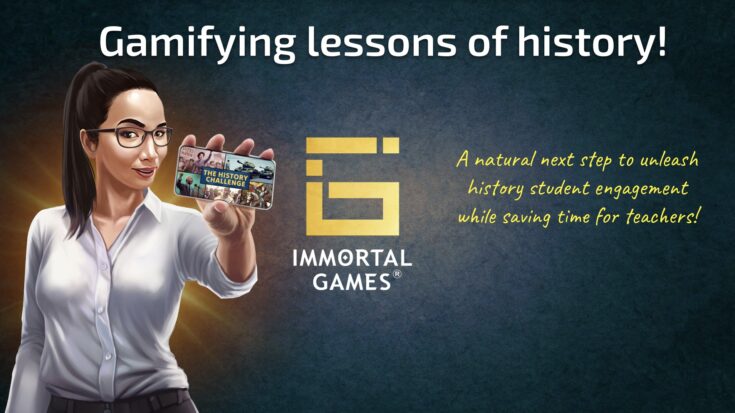
A concept inspired by shared experiences with his son
Ole’s vision to use interactive storytelling for educational purposes began through shared screen experiences and remote-control gameplay with his autistic son.
“My son is struggling with autism. Having a normal conversation with him has always been challenging. Then back in 2013, when he was 13 years old, I found a game that I played myself because of the interesting challenges, and I asked my son if he wanted to play it. When he tried the game, what caught his interest was the storytelling, and we started interacting via the different game characters. Suddenly we had a universe where we could co-exist,” Ole shares.
The realization that the same approach to storytelling might be harnessed for educational purposes later led to the creation of “The History Challenge.” This set the stage for a unique blend of gaming and learning.
The core idea revolves around creating a virtual experience that will make history education more engaging and interactive, while stimulating curiosity and critical thinking skills. Students will navigate through historical narratives, while making choices that impact their learning journey. The inclusion of challenges, quizzes, mini essays, and interactive tasks ensures a comprehensive understanding of the subject matter. The end result is not just a score that can be used for grading, but also a foundation for further learning.

Finding it difficult to connect with history
While initially aimed at teenage children, the platform is created to be used by students of all ages.
Ole envisions the project expanding globally, with gamified lessons becoming a preferred tool for history education worldwide. The goal is not just to impart knowledge, but to make history a dynamic and enjoyable learning experience for students.
“The primary challenge we’ve identified for students is that they find it difficult to connect with history. They simply struggle to make it feel relevant. This challenge is aggravated by existing teaching methods and textbooks, that often result in a lack of engagement. Essentially, students are finding it hard to see the relevance of historical content. We try to change that,” Ole says about the team’s shared vision.

A carefully selected team
The project was kicked off with extensive research, ensuring high-quality historical content. A team, consisting of lesson designers, graphic designers, writers, and programmers, is collaborating to bring the concept to life. Their previous experience with another storytelling game has provided the carefully selected team with valuable insights into creating an engaging historical narrative.
“Currently, everyone on the team was also a part of the first storytelling game I did back in 2019. Two team members are dedicated to working on it full-time, while the others contribute on a part-time basis for flexibility. We’ve gained interest from several individuals who are eager to join us once we have established proof of concept. At this stage, our primary focus is on validating the market to confirm demand for the product,” Ole shares.
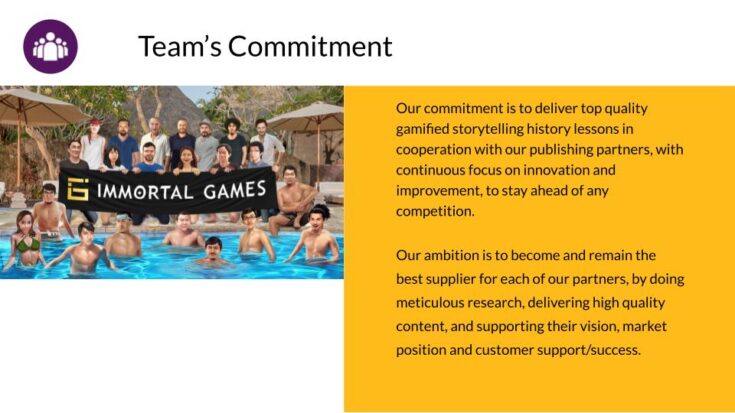
Game development in picturesque Bali
2011 was the first time Ole sat foot in Bali. Shortly interrupted by living two years in Germany, he returned to Bali in 2015.
“Struggling with the aftermath of the financial crisis, a friend invited me to come stay with him in Bali in 2011. On the second day, I decided to make it my home. Having explored 42 countries, Bali was the first place where I immediately found a sense of belonging,” Ole shares about his choice of location for his project. A project that differs from the usual ventures that unfolds on the tropical island.
Still, Bali also served as the backdrop for Ole’s first endeavor into storytelling game development.
“The initial venture proved more challenging than anticipated. Despite an existing market for storytelling content, finding a publisher or partner proved difficult,” Ole says.
“Creating that first game is still an achievement I personally take pride in. Crafting that game was the most complex creative endeavor I’ve ever undertaken. Even though its success remains uncertain, it laid the foundation for creating The History Challenge,” he adds.

Still a work in progress
The history lesson game concept has evolved through surveys, tests, and teacher verification and advice. The constant focus has been on addressing the disconnect students feel towards history. The goal is to make a product with the potential to redefine how history is taught. The process has involved studying various curricula and spotting potential early adopters, including the Cambridge teaching method, and the EU Council’s principles and guidelines for teaching history in the 21st century.
“We’ve made sure to incorporate all the core principles and that we meet all key criteria with our concept. Our goal is to establish a new standard for the way history is taught. Essentially redefining the approach to historical education.”
History teachers and professors have played a crucial role in the development process. The team is currently on its fourth version of the first lesson. To improve they are actively seeking feedback from educators to refine the platform. Continuous collaboration with teachers ensures that the gamified lessons doesn’t just align with educational goals, but also effectively engage students.

Setting goals
The quest for a minimum viable product (MVP) led to the development of the first lesson – the Battle of Britain during World War II. The lesson is presented in a comic-style format with a blend of fictional storytelling and factual content. With around 20 investors supporting the initiative, Ole emphasizes the importance of proving the concept’s viability before a full-scale implementation.
“Our current goal is to finalize the Battle of Britain trilogy and be prepared for offering it to the market by the start of the school year in August 2024. We anticipate a full-scale launch to take place during that academic year. But until that point, our focus will be on completing the first lesson series to have a high-quality product to sell, establishing proof of concept, and gradually expanding our initiative,” Ole explains.
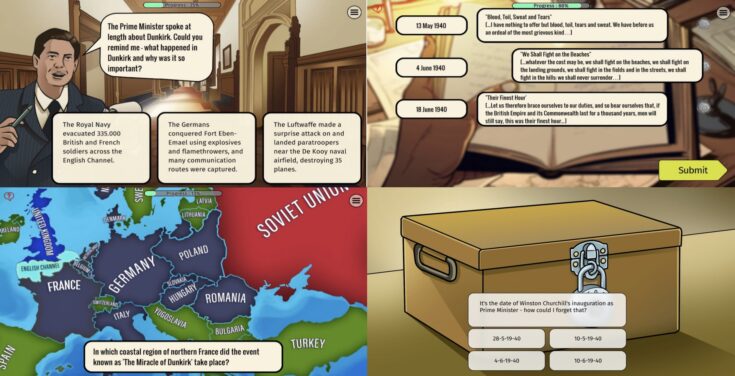
What the future holds
As the first lesson nears completion, the company is participating in an incubator program with hopes of qualifying for grants and attracting further investment. The long-term vision includes finding a big investor to scale the project, enabling the creation of more teams to speed up the creation of further lessons.
“There are approximately 250 million potential users in schools alone, excluding countries with autocratic regimes. While I don’t have precise figures on how many of these students are also gamers or engage in gaming during their spare time, the number is estimated to be quite high. If we consider the whole target market, a substantial percentage – maybe as many as 70-80%, might prefer learning through this interactive approach. However, the exact percentage of those who will remain preferring traditional methods, such as reading books, remains uncertain. But it is still clear, that there’s a huge potential market for a product like The History Challenge.”
Game demo: immortalgames.co.uk/battle-of-britain/
For more information: linkedin.com/ole-petter-hoeie
Also read: How online games can change people for the better


